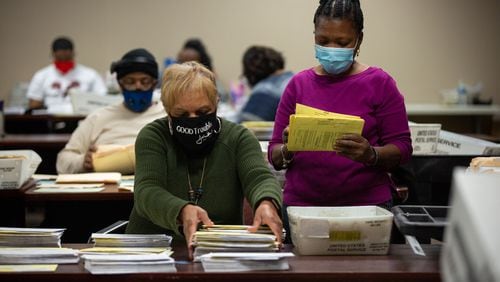Among the 64 potential witnesses for the defense are a who’s who of Capitol lobbyists and politicos, from former governors to longtime Gold Dome power brokers:
Roy Barnes, former governor.
Sonny Perdue, former governor.
David Ralston, speaker of the Georgia House of Representatives.
Doug MacGinnitie, state revenue commissioner.
Michael Bowers, former attorney general.
William Ray, Georgia Court of Appeals judge, former state senator and officemate of Balfour.
Walt Ehmer, president/CEO of Waffle House Inc. (Balfour’s employer).
Eric Johnson, former president pro tem of the Senate, now a government consultant.
Trip Martin, veteran lobbyist for American Express, The Atlanta Braves, Georgia Hospital Association, others
Mo Thrash, lobbyist for Georgia Independent Automobile Dealers, Georgia Utility Contractors, Mortgage Bankers Association of Georgia, others
And about 17 other lobbyists, other Waffle House executives, the mayors of Norcross and Dacula, Balfour’s wife Virginia and others. The full list appears on myajc.com.
State Sen. Don Balfour, R-Snellville, goes on trial Monday for claiming reimbursements from taxpayers for expenses he never incurred. His attorneys will build Balfour’s defense on the simplest of arguments: Mistakes happen.
And to make the case they’ll call on the testimony of a who’s who of Capitol lobbyists and politicos, from former governors to longtime Gold Dome power brokers.
Will a jury buy it? Experts say they might. Under the law, prosecutors must prove that Balfour, once one of the state’s most powerful Republicans, purposely tried to defraud the state.
“Don is looking forward to having this behind him so that he can go back to doing what the people of his district elected him to do, and that is serve their interests in the Georgia General Assembly,” said Balfour’s lead attorney, Ken Hodges. “There was never any intent to submit inaccurate reimbursement requests … Don has admitted the mistakes and regrets them.”
Balfour, who has an accounting degree, is charged with 18 felony counts related to filing false expense claims. A grand jury indicted him in September on allegations that he charged the state for expenses on days he did not incur those expenses. If convicted on all counts, Balfour would face up to 10 years in prison and thousands of dollars in fines. He also would lose his seat in the Senate.
State Attorney General Sam Olens’ office is prosecuting the case. Through a spokeswoman, Olens declined to comment, although members of his staff have indicated they, too, will simplify their strategy: A person may not have meant to break the law, but that doesn’t give him a free pass.
Both sides expect a quick trial, lasting only a few days. Prosecutors have whittled their witness list from about 19 to between three and five. Olens’ office has not released its witness list, but one subpoenaed state witness is Sen. Josh McKoon, R-Columbus, who filed the original ethics complaint against Balfour.
The defense list of potential witnesses names 64 movers and shakers including former governors Roy Barnes and Sonny Perdue; state Sen. Tommie Williams, R-Lyons, the chamber’s former president pro tem; and influential lobbyists like Trip Martin and Mo Thrash. Hodges said he expects to call about 20 witnesses for “quick” testimony.
If Balfour is convicted, he will lose his Senate seat and Gov. Nathan Deal will have 10 days to call a special election to be held 30 to 60 days later.
If he is found not guilty, Balfour — the Senate’s longest-serving Republican — will be in position to retake his seat in the Senate, placing his Republican brethren in the awkward position of welcoming him back just a few weeks after they stripped him of his committee assignments and kicked him out of the GOP caucus.
They did so when Deal suspended Balfour last month pending the trial after a three-member panel found him unfit for office.
Last year, after problems with Balfour’s expense reports became public, the Senate removed him from the chair of the Rules Committee. The Senate Ethics Committee also rebuked Balfour last year, fined him $5,000 and ordered him to repay the state about $350.
Still, Balfour’s seat is important to the majority party. Republicans hold a one-seat “supermajority” in the chamber, meaning they can pass constitutional amendments without the consent of Democrats. Such amendments still must be approved by voters.
William Hill Jr., a member of Balfour’s defense team, hinted at the defense’s strategy after a motions hearing last week. Balfour is a busy man who made a mistake, he said.
“Mr. Balfour, like a lot of us, rather than submitting your expense vouchers the very next morning when you walk in and hand them to your secretary, it was about two and three months later,” Hill said. “He’s looking at his calendar and trying to remember where he was and what he was doing.”
Hill acknowledged that Balfour was wrong. But he said the senator wasn’t trying to break the law; he just made a mistake, Hill said, as anyone could.
“He admits he could have been more diligent and he could have been more attentive,” he said. “Like most people, he is doing a hundred things at a time.”
This “mistakes were made” defense is important because Balfour’s state of mind is crucial to a conviction. Sixteen of the eighteen charges accuse the senator of “making a false certificate,” a charge stemming from a law specifically regulating the expenses of state legislators. The law holds that lawmakers caught submitting a false report face up to five years in prison, provided they filed the report “knowing it to be false.”
Former federal prosecutor Richard Goolsby Sr. said intent is a tricky aspect of prosecuting some public corruption cases.
Goolsby, now in private practice in Augusta, was the lead prosecutor in the 2005 trial of state Sen. Charles Walker, who was sentenced to 10 years in prison on 127 counts of mail fraud, tax evasion and conspiracy.
Goolsby said cases against politicians can be complicated because such cases often deal with special areas of the law that apply only to officeholders, such as what can be done with campaign money.
“In some cases the politician has a big campaign account with many incoming checks and outgoing expenditures,” he said. “It presents a challenge to determine whether the political figure knew what was going on.”
In the case against Walker, part of what Goolsby had to show jurors was that the former senator intentionally mishandled money in his campaign account. Prosecutors in Balfour’s case likely will have to show he knew what he was doing was wrong.
Goolsby said jury selection for a public corruption trial is complicated because the defendant often is known to the jury pool. It would be a bigger problem if the trial was in Balfour’s home district in Gwinnett, but the trial is in Fulton County because that is where the alleged crime occurred when he filed the expense reports.
Even so, Goolsby said jurors often have strong opinions on state lawmakers.
“That could cut both ways,” he said. “An attorney on either side would want to be very careful in jury selection.”







